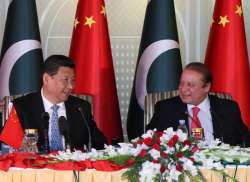Kabul blasts: China defends 'all-weather ally' Pakistan, says one nation can't tackle terror alone
A global consensus had been achieved that the international community had to jointly tackle terrorism. No single country or party has the capacity to tackle the menace alone, observed China’s Assistant Foreign Minister Li Huilai

Just days ahead of the summit of the Shanghai Cooperation Organisation (SCO), scheduled to begin from June 7, China today sought to defend its ‘all-weather ally’ over accusations that the Kabul blasts were perpetrated by Pakistan intelligence-backed Haqqani network. Asked to respond to the charge, China said it opposed all forms of terrorism while asserting that countering terror is a shared global responsibility and not one exclusive to one nation.
"Beijing opposes all forms of terrorism. A global consensus had been achieved that the international community had to jointly tackle terrorism. No single country or party had the capacity to tackle the menace alone,” observed China’s Assistant Foreign Minister Li Huilai, citing the string of terror attacks that targeted Afghanistan, Britain, and the Philippines.
China, he added was willing to work with all parties “bilaterally or regionally” to achieve regional stability.
The response by Beijing assumes significance in view of Kabul’s allegations that the Haqqani network, which it says is backed by the Pakistani intelligence, of being behind the recent suicide attack in Kabul’s diplomatic quarter that killed over 90 people and injured scores others. Pakistan has maintained it had no hand in the attacks and that it is equally a victim of terror as other countries in the region.
Li also confirmed that India and Pakistan will become full members of the SCO during the course to grouping’s summit in the Kazakhstan’s capital Astana later this week.
He said that during the summit, a resolution would be passed “according status of membership to India and Pakistan”. With the inclusion of the two countries, the “geographic coverage (of the SCO) will be extended to South Asia, covering three-fifth of the Eurasian continent covering half the population of the world”. Consequently, the SCO would become more representative, with an enhanced potential for cooperation, he observed.
On the contentious issue of India’s entry into the Nuclear Suppliers Group (NSG), China indicated that there was no letdown in its persistence on blocking India’s entry into the elite grouping. The official said that India’s bid for membership of the 48-nation NSG “is more complicated what was imagined previously”, without elaborating how or what had changed.
“China supports the NSG to have several consultations to reach a non-discriminatory and universally applicable solution to all the members of the NSG,” he added.
(With agencies)